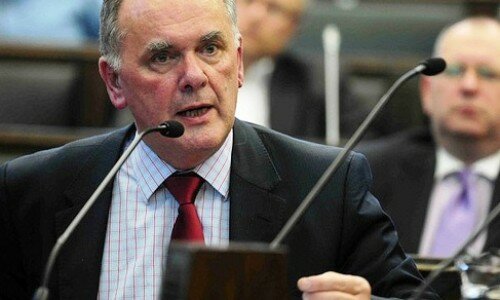
Sir Albert Bore’s message to Ed Balls: ‘Your negative HS2 views could plunge Labour into open warfare’
Ed Balls’s “negative” views about HS2 risk plunging the Labour party leadership into open conflict with the Midlands and the north of England in the run-up to the 2015 General Election, Birmingham City Council leader Sir Albert Bore has warned.
Sir Albert said the shadow chancellor’s insistence that he would “not write a blank cheque” for the high speed railway was unhelpful and appeared to signal a significant weakening of Labour’s commitment to the £42.6 billion project.
In a blunt letter to shadow transport secretary Mary Creagh, he urged Labour to get behind HS2 and not to “boost opposition to the project by appearing to question its value very publicly”.
In his letter to Ms Creagh Sir Albert said: “I have to say that recent messages from senior Labour politicians have not helped our cause at all. The press release put out in your name yesterday contained very similar words to those used by Ed Balls in his speech in Brighton and appeared to signal a significant weakening of the party’s commitment to the project.
“Of course it is important for oppositions to hold governments to account on how they deliver large projects. But the scale of HS2 means it must continue to have the cross-party support it has enjoyed to date and it is important that the party does not end up boosting the opposition to the project by appearing to question its value very publicly.”
He warned of conflict between the Core Cities group, including Birmingham, Leeds, Sheffield and Manchester, and the Labour party leadership in London. Leaders of the other core cities have written to the shadow transport secretary in a similar vein.
Sir Albert hinted at a Labour civil war if Mr Balls succeeded in pulling support for high speed rail: “If the party continues to put out such a negative message on HS2 I will be concerned that there will be a protracted public conflict between the party’s leadership and the Labour core cities at a time when we should be working closely together.”
His comments were delivered as the government published the latest HS2 business case, which indicates a slightly lower amount of benefit relative to the cost of the scheme.
The expected benefit-cost ratio has fallen from £2.50 to £2.30 in benefits for every pound spent. The fall is mainly due to a £10 billion rise in the scheme’s projected £42.6 billion cost, which was added earlier this year.
However, the report argues that the alternative to HS2 would mean 14 years of route closures and longer journeys as existing railway lines were improved to take create additional capacity.
A study, by Network Rail and the management consultancy Atkins for the government, said that without the project, there would have to be 2,770 weekend closures on the East Coast, West Coast and Midland main lines for the same intended capacity of HS2.
This could lead to travel times between London and Leeds doubling.
Transport Secretary Patrick McLoughlin said without the new line, the West Coast, East Coast and Midland Main Lines were likely to be overwhelmed.
He warned HS2 needed broad political consensus or it would end in nothing: “You can’t play politics with our prosperity. The new North-South line is a multi-billion, multi-year investment in the future of Britain.”
Sir Albert described HS2 as the single most important infrastructure project currently planned in terms of brining growth and jobs to all city regions, with a £15 billion a year boost to the economy according to research by KPMG.
He challenged Mr Balls, the shadow chancellor, to demonstrate “some positive commitment” to HS2, adding that failure to build the line would lead to chaos with overcrowded services between Birmingham and London where 5,000 commuters a day would be forced to stand for the entire length of their journey.
Sir Albert warned that the West Coast Main Line, between Euston, Birmingham, Manchester and Scotland, would be full to capacity by 2020 at the current rate of passenger growth.
As well as increasing capacity HS2 will lever in investment worth millions of pounds around new high speed rail stations including a terminus at Curzon Street, Digbeth, Sir Albert claimed.
Similar Articles
Confidence growing for a Combined Authority for Christmas 0
We had a great Think Birmingham event on Monday night in the City's Council House with a
Forward into battle as Tilsley slams council’s ‘Pravda’ newspaper 0
The latest edition of Birmingham city council’s free newspaper ‘Forward’ has been branded a Labour
Chance to have your say on Birmingham council’s competence 8
The senior civil servant investigating Birmingham city council’s competence has invited people to have their
Arts and culture budget at risk as Birmingham council enters ‘cuts end game’ 8
Birmingham council’s desperate search for £800 million of savings has entered the end game. City leaders
Commission says ‘Set the Cities Free’, but West Mids unlikely to head devolution queue 20
Powerful city regions run by elected mayors with tax-raising and spending powers must be at










